
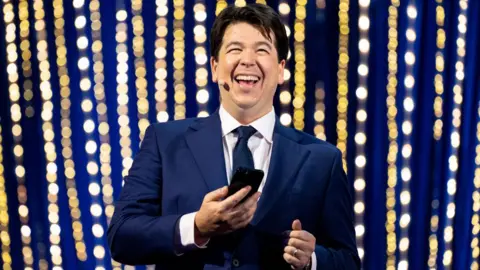 BBC
BBCThe BBC’s annual report will be published later, with the usual names likely to dominate the star salaries list.
Once again, Gary Lineker and Zoe Ball are expected to be among the corporation’s top earners, thanks to their jobs hosting Match of the Day and Radio 2’s breakfast show respectively.
But there are many, many more stars who earn huge amounts of money from the BBC, several of them almost certainly more than Lineker and Ball, whose names will be absent.
That’s because of a quirk which means the BBC does not have to disclose the salaries of stars who are paid through production companies.
As a result, the hosts of some of the BBC’s biggest shows are missing and escape the glare of media and public scrutiny every year.
They include Michael McIntyre, Bradley Walsh, Alex Jones, Paddy McGuinness, Claudia Winkleman, Romesh Ranganathan, Alexander Armstrong, Richard Osman, Lord Sugar and Graham Norton.
Winkleman’s Strictly co-anchor Tess Daly is also usually absent, as are the show’s judges Craig Revel Horwood, Shirley Ballas, Motsi Mabuse and Anton Du Beke.
And we know nothing of the sizeable number of actors and creatives connected to major soaps and dramas such as Doctor Who, Casualty, EastEnders and Call The Midwife.
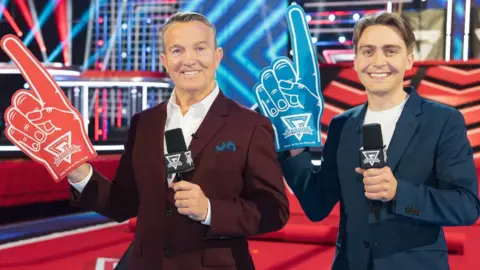
The BBC has disclosed the salaries of talent and executives earning above a certain threshold (currently £178,000) since 2017, when it was compelled by parliament to start including the information in its annual report.
But salaries of stars paid via production companies are not published, including those who receive payments through BBC Studios, the corporation’s own commercial arm.
It’s not difficult to guess, however, which names might be near the top of the salaries list if it was a complete picture.
As the host of both The Wheel and Michael McIntyre’s Big Show, Michael McIntyre is regularly seen on BBC One in primetime on Saturday nights throughout the year.
With that kind of real estate and his high profile, there is no way McIntyre would not be one of the corporation’s top earners. But he has never appeared on the list.
Similarly, Bradley Walsh is one of the UK’s best-loved presenters. Despite being well known for ITV’s The Chase, he fronts several high-profile shows for the BBC too, including Blankety Blank and Gladiators.
Other stars would likely appear on the list thanks to the sheer number of episodes they film. Alexander Armstrong, for example, presents hundreds of episodes of Pointless, which is broadcast every weekday on BBC One.
Even factoring in that some of these are repeats, it’s likely Armstrong will be on a healthy salary.
Richard Osman, who still appears alongside Armstrong on Pointless Celebrities as well as fronting his own show House of Games, would also probably appear if the rules were different, as would quiz show hosts Ross Kemp, Sandi Toksvig and Victoria Coren-Mitchell.
Romesh Ranganathan, meanwhile, hosts several programmes for the BBC, including documentaries and The Weakest Link, for which he is not listed. (We’ll find out next year if the salary for his new Radio 2 weekend show is made public.)
Other big BBC names not featured include Paddy McGuinness, who has fronted shows including Top Gear, Catchpoint and I Can See Your Voice, and Later host Jools Holland.
It’s almost certain Graham Norton would also appear, although his salary would be significantly less than it used to be, following his Radio 2 exit in 2020 and the recent reduction in the number of episodes of his BBC One chat show.
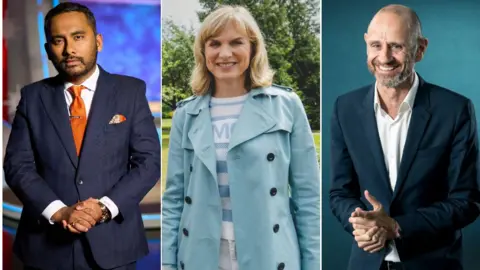 BBC/Getty
BBC/GettySome presenters occupy a slightly different category; those who do appear on the list, but only for some of their BBC work.
Amol Rajan is listed due to his role as a news presenter, fronting Radio 4’s Today programme and its podcast, but not for his work presenting quiz show University Challenge.
Similarly, Evan Davis appears for his role as the host of Radio 4’s PM, but not for voicing BBC Two’s Dragons’ Den.
(None of the Dragons are on the list either, incidentally, so we don’t know what the BBC pays Steven Bartlett, Deborah Meaden and co.)
Another news presenter, Fiona Bruce, is listed for Question Time and news bulletins, but not the Antiques Road Show.
Clive Myrie appears for his work as a newsreader but not for hosting Mastermind or his travel documentaries.
You may have noticed the pattern here – news presenters are included for their journalistic and radio presenting work, but their TV entertainment programmes are exempt.
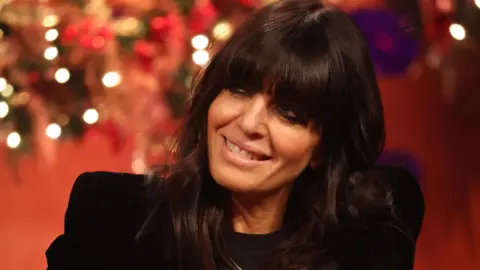
Because BBC Studios is a commercial organisation, not underpinned by the licence fee, it is in competition for business with the BBC, streaming services and other broadcasters.
As a result, the corporation successfully convinced the government that BBC Studios’ salaries should not be listed.
The BBC argued Studios should be treated on a level playing field with independent production companies which, as commercial operations, are not required to disclose pay.
There was one year, however, where some stars paid via commercial entities were included on the list.
The very first annual report to include salaries, published in 2017, did feature many of the commercially-paid names, before they were privatised in time for the following year.
But since 2018, everybody paid via a production company, BBC or otherwise, has vanished.
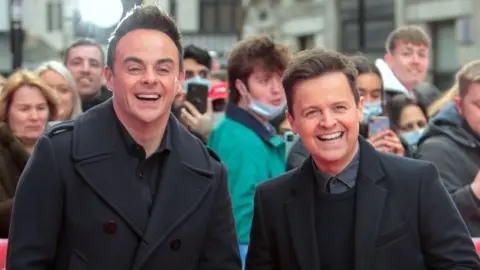 Getty Images
Getty ImagesThe publication of the salaries is still highly controversial within the media industry today, particularly considering other broadcasters do not have to do it.
Ant and Dec are likely to be the most well-paid TV presenters in the UK, with their most recent deal with ITV said to be worth more than £30m over three years.
They present several shows for the network – Britain’s Got Talent, I’m A Celebrity… Get Me Out of Here!, and, until it was rested recently, Saturday Night Takeaway.
When some presenters on commercial networks are paid as much as this, does anyone particularly care how much Craig Charles gets for hosting a specialist show on 6Music?
Well, yes actually, the BBC’s critics say. The fact the BBC is publicly funded via a mandatory licence fee, many argue, means it’s only right that the BBC tells the public how their money is being used.
Ultimately, however, it’s unlikely the names of those paid via production companies will ever be put back on the list. So you can expect Gary Lineker and Zoe Ball to continue dominating the headlines every July for a while yet.



Be the first to comment